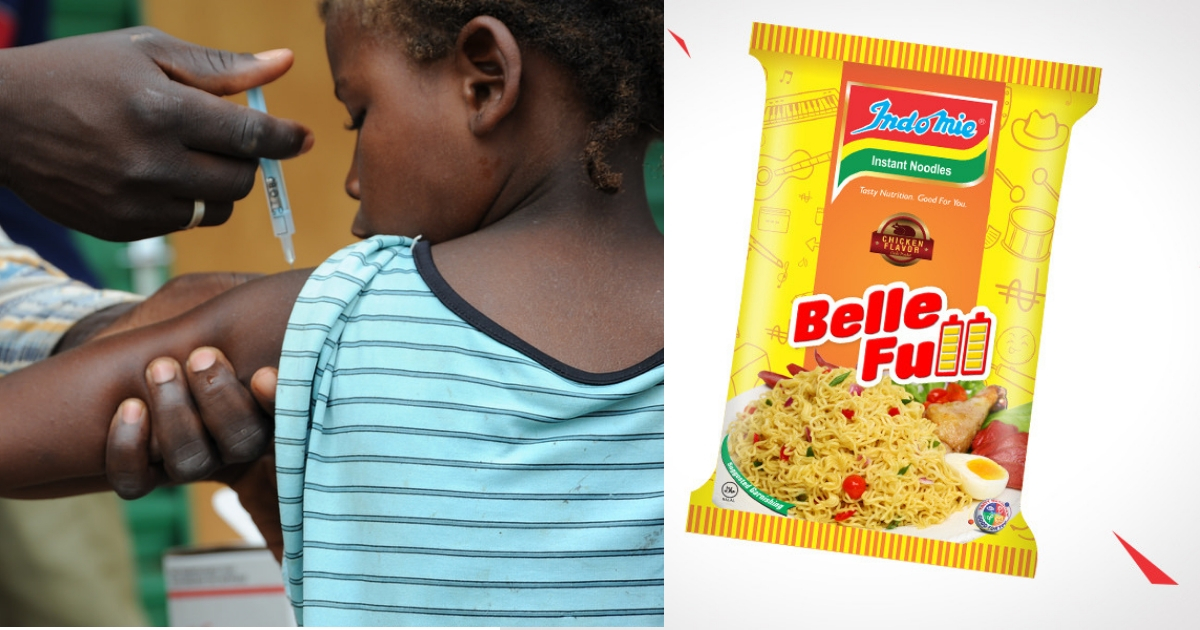Oh Indomie, what can’t you do?
So as some of you are probably aware, Indonesia’s most beloved brand of instant noodles, Indomie, is also crazy popular in some other countries, perhaps nowhere else so much so as in Nigeria (seriously, it’s so insanely popular there that Indomie is becoming the generic term for noodles among young people).
Another thing that Indonesia and Nigeria have in common (unfortunately) is dangerously low vaccination rates for children.
In Indonesia, concerns that a government measles/rubella vaccine drive was using a non-halal vaccine, including mixed messages from Islamic authorities on whether it was still acceptable to use, have led to extremely low MR vaccination rates in many parts of the country.
In Nigeria, there was a mass boycott of the polio vaccine in 2003 over rumors it contained anti-fertility agents, causing polio cases to skyrocket.
The country has been trying to recover from that devastating setback ever since. After some gains, their polio vaccination campaign once again faced major setbacks this year after rumors circulated on social media that men in army uniforms were forcefully vaccinating school children and injecting them with diseases such as monkey pox.
But the Nigerian state of Sokoto, working with UNICEF, seems to have come up with a brilliant solution to get kids and their parents behind their polio immunization program — harnessing the power of Indomie.
As reported by The Nigerian Tribune, UNICEF and the Sokoto government created a program to get children five and under the fractional inter-reactive Polio Vaccine, (FIPV) as well as oral polio vaccines by offering a free pack of Indomie to each immunized child “to serve as encouragement for the children to voluntarily accept being immunized”.
Aliyu Abubakar, a local immunization official in Sokoto’s Dange-Shuni region, said the Indomie social mobilization strategy worked even better than they had planned for. During a news briefing he said their initial target was to immunize 58,813 children, but many more parents turned up in order to get in on the Indomie package.
“We even exceeded our daily target because of the number of children that came out to be immunized since the beginning of the exercise,” he said as quoted by The Daily Nigerian, noting the program would be expanded to other regions of the state.
Another immunization officer, Isa Aminu, also said he was happy with how well the program worked, noting that the vaccines were not refused like before and traditional and religious leaders had lent their support to it as well.
The reports don’t make it clear if Dufil Prima Foods, the manufacturer that has the license for and produces Indomie in Nigeria, was involved in the incentivization program but this initial success is certainly a testament to the brand’s power in the country.
Could a similar Indomie initiative work wonders for vaccination rates in Indonesia? We sort of doubt that Indomie manufacturer Indofoods would want to get involved in what is sadly still such a controversial subject as vaccinations have become here, but we believe that our country’s shared love for instant noodle goodness can and should transcend such controversy, especially if it could help our kids live healthier lives (let’s not get into the matter of the theoretical health complications caused by bribing children with instant noodles — one thing at a time).





Reader Interactions